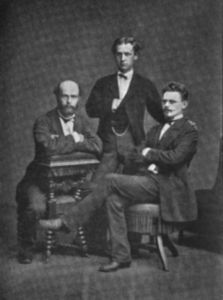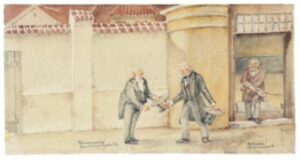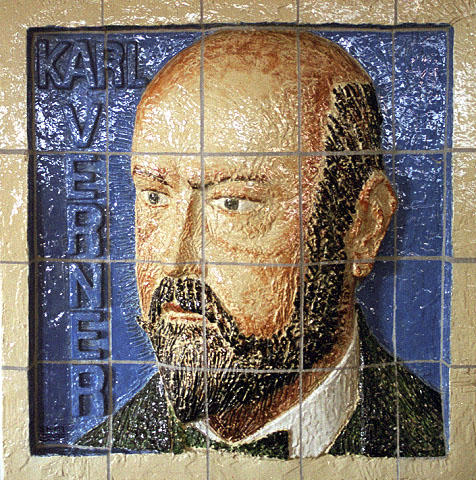Lingoblog is celebrating the summer with a biography of the world-famous linguist Karl Verner in four parts. In case you missed the first part of the series, you can follow this link. Read along next week where you can read more about Verner’s professional life.

Shortly after making his discovery, Verner shared it with Vilhelm Thomsen (1842-1927) who was an editor for a Danish scientific journal. A linguist himself, Thomsen later became an internationally highly regarded specialist within the field of Indo-European linguistics. He thought the discovery to be true and encouraged Verner to send a manuscript to a German journal so that the groundbreaking discovery could be distributed to a larger audience. Because of this, Karl Verner had his discovery printed in the German scientific journal “Zeitschrift für vergleichende Sprachforschung”. These 34 pages made him world-famous and ensured him his career. The Academy in Berlin granted him the sought-after Bopp prize in 1877. He was offered a position as a professor at the university in Graz. In 1883, he became part of the Dutch Maatschappij der Nederlandsche Letterkunde te Leiden due to his discovery. The university in Heidelberg made him an honorary doctor in 1887. And in 1888 he was appointed a member of The Royal Danish Academy of Sciences and Letters.
The school years at Aarhus Cathedral School
Karl Verner started school at the age of four. That was early at that time too, and because of this he started at the Cathedral School at age eleven, where he attended school from 1857 to 1864. For his final exams he finished with the excellent grade ‘mg’ in all subjects. As was typical for that time, grades were thought to be important, which is why his obituary mentions that he as a rule was either first, second or third in his class. However, there were no signs that he should later become a world-famous linguist. Modern languages (German and French) as well as math were his best subjects, however in the – at the time – highly important subjects Latin and Greek, he sometimes had to settle with the lesser grade ‘g’. Still, he had a reputation within his year that he was the best at Latin. Karl Verner was a kind and diligent student. Only once he had a note in his grade book: “Remark for disruption”. However, this was because of a serious insult of the principal Hans H. Blache, as perceived at the time. During the morning assembly where they sang, Karl Verner had seized his chance to put a dry cabbage stalk into the principal’s high hat. Thoroughly insulted, Principal Blache (1787-1871) wanted to expel this unruly kid from the school. If not for his favorite teacher, the geography teacher Edvard Erslev, who interceded with him, Karl Verner’s career would have ended then and there.
Although it is said that Verner did not unfold as an extension of or due to his scholarly abilities (Prof. Albeck in Arosia), it is a fact that his phonetic interests were already present at the Cathedral School. A letter from 1872 shows how he in the middle of a Latin lesson made an interesting phonetic observation. Professor Madvig (1804-1886), one of Europe’s most important classical philologists, was supervising the teaching in Verner’s class (4th grade) towards the exam in 1861 due to his role as a course inspector.

Let us hear it from Verner himself:
“… we had written Latin essays, Madvig had read them and wanted to speak to us for a couple of hours about specific points in the essays. He was sitting at the teacher’s chair with his eyes closed and his head nodding, as I have since seen him when he has to develop his thoughtful sentences. After having developed a rule about pronouns in relative sentences (ego, tu, qui…) he wanted to make a sentence with a word we were familiar with and asked “What is a ‘Fi’ne’ in Latin?”. No one could answer him, we boys looked at each other as this word was unknown to us in Danish, let alone Latin. I counted as the best Latin student in that course, and Madvig had publicly given my Latin essay the complement “very promising”, of which I was most proud. So I dared to answer: Ficus! [English: fig] – ”Oh no no! A ’Fi’ne’, do you not know what a ’Fi’ne’ is in Latin? … It is called hostis.” ”Well well, an enemy!” [Fjende in Danish /red] we said in unison. “Yes, a ‘Fi’ne’” Madvig concluded, apparently still believing that the confusion was due to our education and not his pronounciation. At the time, I could not imagine that the greatest philologist in Denmark spoke Bornholmish-Swedish, and the obvious discrepancy from the written word made me think about the spoken and written language, which were of course wild at first so that I started speaking like I was writing at first and later shifted to the other extreme and wrote like I was speaking: Both completely crazy!”
Later, Verner expressed that he in his school years had already had an interest in comparative linguistics. Karl Verner’s favorite teacher was the geography teacher Edvard Erslev (1824-1892). Verner liked Erslev’s geography book and his teachings. In addition to the dry facts about geography, Erslev taught his students about the linguistic and social conditions in foreign countries in an interesting way. Erslev treated the subject contrastively, – one can acceptably say that Verner’s interest for the constrastive method was born here.
Erslev was to influence his former student later on during his time at university as well.
Time at university in Copenhagen and Sct. Petersburg
In 1864, Karl Verner began his studies at Copenhagen University. He started studying classical languages, but later changed to Nordic languages. He ended up – with influence from his teacher Professor Smith – at the department of Slavic language studies. From December 1871 to October 1872, Karl Verner was on a study visit in Sct. Petersburg taking up Slavic studies.
Because of his chosen subjects of study Karl Verner had no prospects of tenure within the field of teaching. And since he did not have any wealth of his own either, the future after his studies was uncertain. A teaching position at the university would not be possible because, as he wrote in a letter in June 1876 to one of his linguistics colleagues, Wilhelm Scherer (1841-1886), who was a professor in Germanic at the University in Strasbourg: “People see me as some kind of deserter from the only true classical philology to a line of study which for us, even though we have a professorship, is not fully acknowledged yet.”
Frontpage picture: The sculptor Knud Nellemose’s stoneware relief. On display at the Verner-room in Nobelparken, Jens Chr. Skous Vej, Room 366, Building 1481.
The article “Karl Verner – A world-famous student” has previously been published in the book Aarhus Cathedral School, 1195-1995, edited by Finn Stein Larsen. Aarhus: Aarhus Cathedral School, 1995.
Lars H. Eriksen. Born in 1957, graduate with A-levels in modern languages from Aarhus Cathedral School in 1976, studies in Nordic, linguistics, Germanische Philologie as well as studies in law, tax law and economy at the University of Aarhus, Universität Düsseldorf, Universität Bayreuth and University of Southern Denmark. Cand. phil i dansk 1982, Ph.d. 2001 on a dissertation on “The language of the court in Denmark and Germany” (“Sprache vor Gericht und in der Verwaltung”) – Associate professor in Danish in Bayreuth 1980-90, law. in Bavaria 1990, then Rechtsreferendar in Bayreuth, employee at law firms in Düsseldorf, Saxony and Bavaria. 1996-2001 University lecturer in Danish and German at the cross-border studies in Sønderborg and Flensburg. Collaborator on international language projects on language policy and language law; tax law, EU corporate tax law and criminal law. Employee at the European Commission on International Social Security. Now working as a tax consultant in international affairs in South Schleswig. Has written articles on German and Danish language matters, language teaching and legal topics. Publisher of several Danish-German dictionary works within law and tax / annual accounts 2016-2021





